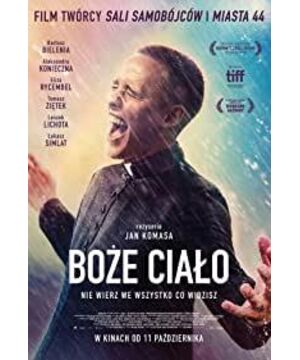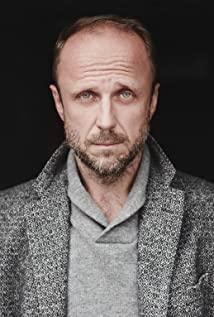Who is qualified to serve God? Who has the final say? Danny, the protagonist of the Polish film "Alternative Priest" (Boże Ciało), is a juvenile delinquent. After he converted to Christ, he hoped to become a priest. Father Thomas, who shepherded him, poured cold water on him, bluntly saying that no seminary would accept people with criminal backgrounds like him. Everyone is a sinner and they are all equal, but is there still a hierarchy in heaven? "Alternative Priests" on the one hand allows us to see the subtle tension between religion and belief, on the other hand it reveals that religion is still a part of the real world. Danny did not go to work in the sawmill according to the provisions of parole, and rushed to a nearby town. Hu Xu was a priest, but accidentally hit and became a temporary substitute for the priest in the town.
This absurd situation raises questions about authenticity: Is it true that only real priests (approved by the Holy See) can really shepherd believers? On the other hand, is the true priest necessarily the true shepherd? Danny had the opportunity to work as a substitute because the only priest in the town was drunk and had to go to a nursing home to stop drinking. Danny bit his head and realized his dream again. He put on a holy robe to celebrate Mass, but he hadn't received theological training. How to preach? "Silence can also be prayer. We don't come here to pray mechanically... Prayer is to chat with God." He repeated what Father Thomas said in the discipline, and added his own thoughts: "You are so pure, How do I represent you as a sinner? Or pray..."
In fact, even if Danny did his best to play the role of priest and admitted that the rules of the Holy See for clergy have meaning and should be abide People-not to mention pretending to be a clergyman is itself a deception. In fact, he himself was a person who needed to be pastored, but he was rejected by the local Catholic church system. Danny is categorical and wants to enter the seminary, but he doesn't even have the qualifications to sign up; when he arrives in the small town, the original priest cannot protect himself and cannot take care of Danny's faith and life.
But there was a mistake. The enthusiastic Danny, with his lively preaching and friendly style from his heart, attracted more small town residents to go to church. It is not the church who chooses the servant of God, but God himself. There was a traffic accident in the town a year ago. Seven residents died. Their relatives have not yet recovered from the pain. Danny is actually an empathetic person. With the emotional management skills he learned in the discipline, he helped the families of a group of young deceased release their suppressed sadness and anger. He does not say that "everything is in God's plan" kind of cliché, but in prayer, he expresses the dissatisfaction in everyone's heart: Why do you allow this suffering to happen? We feel injustice and cruelty, not your good intentions. But Danny also prayed for God's mercy so that everyone could understand his intentions. He did a job that a pastor should do, not a ready-made answer to reiterate "the doctrine is correct," but to heal people's hearts. As a juvenile offender, Danny was also scarred, but turned his gloom into the blessing of others.
However, empathy does not mean giving up right from wrong; Danny also discovered the dark side of the young deceased’s family, that is, they blamed one of the deceased Kobiski for the death of the child because his car collided with the young man. His widow also became a scapegoat and was squeezed and bullied by neighbors: "How can you let your drunk husband drive?" What's more, the original priest did not let the deceased be buried in a small town cemetery, nor did his widow Go to church. God loves sinners, but the church shuts them out. What kind of church is this? After investigation, Danny knew that there was something wrong, and he did not hesitate to escort the love of the believers in the small town to him. He wanted to hold a rest mass for Kobiski, and buried his ashes in the cemetery, so that his widow would return to the church. For this reason, he offended local forces, suffered arson and other threats, and still insisted on seeking justice and reconciliation for the people. "Blessed are those who make peace, because they will be called the sons of God." Compared with Danny, the original old priest, who is the true shepherd? Who is the son of peace? Danny knew he was guilty, and he used this to share with his followers the importance of forgiveness: "Forgiveness is not forgetting, but love, even if they are guilty."
So is Danny a saint who looks like a sinner? He became a model for pastors? No, he is just a graceful sinner, but he is more aware of his sin than others. He is no more noble than the old priest, he is a shepherd working for the Lord. But this does not mean that Danny cannot be a shepherd; his weakness, just like the weakness of the old priest, shows that the shepherd is also a sinner who needs to be shepherd.
Not only sinners need salvation. In fact, being a good man requires grace and some "moral luck" outside of personal will. But things in the world are often: if we lose our horses, we are inseparable from blessings and misfortunes. It was good luck for Danny to return to Christ in the correctional house; the local religious system obliterated his desire to be a priest, but unfortunately; he had the opportunity to pretend to be a priest and really shepherd the residents of the town. It was a strange grace; his lies were exposed. It was a tragic encounter to return to the prison, and it was also the consequence of him impersonating a priest. The enemy bit him here, forcing him to a bloody duel. Danny fell into sin again, losing the joy of being a "priest" on his face, in exchange for the panic like a wounded beast. When he is in a small town and people trust him, he has a chance to become a better person; when he returns to the juvenile correctional house and is only regarded as a criminal, it seems that there is only a way to do evil.
This play juxtaposes the hope of religion and the cruelty of reality. A large number of calm and stable shots glow with a greenish and cool tone. There is no warmth, but the sunlight that occasionally seeps through the window shines on people's faces, like the hands of God. Comfort. The original name of the film is the literal translation of "The Eucharist of Christ", which is the sacrament. The bread that is broken is the body of Christ, and the members of the church who receive it together are also the body of Christ; religion is always a group belief. Perhaps "believers are saved" also points to external conditions, not just personal intentions: you yourself believe that you can be saved, but you also need others to believe that you are saved. Even with grace, personal confidence is still fragile. When the people around Danny are no longer believers but villains, and when the church takes the lead in blocking the pursuit of its pastors because of his criminal status, he will be insecure. The life-saving rope fell back into the abyss. Believing in Christ’s salvation is not just believing in Him to save you, but also believing in Him to save others.
View more about Corpus Christi reviews











